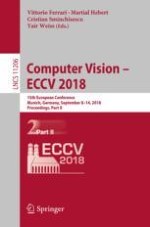2018 | OriginalPaper | Buchkapitel
From Face Recognition to Models of Identity: A Bayesian Approach to Learning About Unknown Identities from Unsupervised Data
verfasst von : Daniel Coelho de Castro, Sebastian Nowozin
Erschienen in: Computer Vision – ECCV 2018
Aktivieren Sie unsere intelligente Suche, um passende Fachinhalte oder Patente zu finden.
Wählen Sie Textabschnitte aus um mit Künstlicher Intelligenz passenden Patente zu finden. powered by
Markieren Sie Textabschnitte, um KI-gestützt weitere passende Inhalte zu finden. powered by
